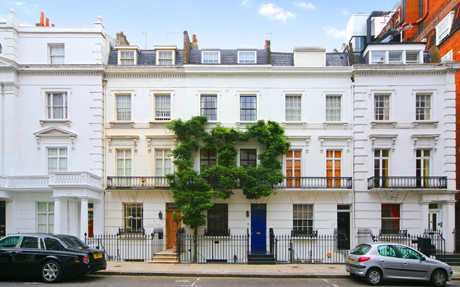Property prices in England and Wales rose by the most in six years in May, fueling concerns that loose monetary policy and a plan to make home buying more affordable may lead to a new housing bubble.
House prices grew by 0.4 percent this month, the highest monthly increase since May 2007, when the U.K. was in the grips of a property boom, according to a report by U.K. property analytics firm Hometrack.
(Read More: Millionaire Homes Mark Carney Can Afford)
Prices were heavily driven by London and the prosperous South East, said Hometrack analysts, growing by 0.9 percent and 0.5 percent respectively.
"The impetus for rising house prices is originating almost exclusively from London and the South East, where prices grew at an above average rate… Elsewhere, housing market conditions are improving gradually, with prices trending slowly upwards, averaging just 0.1 percent over May," said Hometrack Director of Research Richard Donnell in the report, which was published on Monday.
"The gap between supply and demand in London is the largest it has been since spring 2009. In the last six months, demand has grown by 15 percent, while supply has declined by 0.6 percent," he added.
Donnell noted that demand outstripping supply was a nationwide trend in the U.K., with housing sales up 8.2 percent in May, while supply only grew by 2.8 percent.
"The high cost of moving, uncertainty over jobs, and a lack of available housing to move to, means homeowners remain unwilling to put their own properties on the markets. In turn this is putting a further squeeze on supply," he wrote.
(Read More: British 'Castle' Homes for Sale)
Donnell warned that lack of supply could propagate "mini housing cycles".
"In an effort to secure instructions, a growing proportion of property is likely to come to the market at unrealistically high prices. This will lead to fewer sales, and a period of price re-alignment and a continuation of a series of small 'mini housing cycles', which have been in evidence over recent years."
Housing a 'Political Issue'
Analysts at real estate firm Savills noted that the shortfall in housing had become a "political issue" in the U.K.
"House building has failed to keep pace with the needs of a growing population. The construction of social housing has slowed to a trickle. Five years after the credit crunch, a generation of first-time buyers is still largely priced out of the housing market and forced to pay increasingly higher rents," said Savills's Susan Emmett, in a second quarter research note on U.K. residential real estate.
Emmett added that purchasing property in London was particularly expensive, with house prices at over nine times average earnings, and deposits averaging 59,000 pounds ($89,000).
In his 2013 Budget, U.K. Chancellor of the Exchequer George Osborne announced a 5.4 billion pound ($8.2 billion) package to boost the housing market, which included the controversial "Help to Buy" schemes, aimed at helping citizens purchase property.
The Help to Buy schemes are due to start in January 2014 and run for three years. One plan is to offer buyers government loans of up to £120,000 ($181,000) towards deposits on homes worth less than or equal to £600,000 ($907,000). Potential buyers will only need to raise a deposit of 5 percent of the purchasing price.
In addition, the government will launch a mortgage indemnity scheme, compensating mortgage lenders for up to 80 percent of the purchase value of a property, in the event of repossession.
Last week, outgoing Bank of England Governor Mervyn King criticized the plans, calling it "too close for comfort" to the U.S. mortgage guarantee schemes that some blame for triggering the financial crisis.
"I am sure there is no place in the long-run for a scheme of this kind. This scheme is a little too close for comfort to a general scheme to guarantee mortgages," King said, speaking on Sky News's Murnaghan program.
"We had a very healthy mortgage market with competing lenders attracting borrowers before the crisis, and we need to get back to that healthy mortgage market. We do not want what the United States have, which is a government-guaranteed mortgage market, and they are desperately trying to find a way out of that position."
The International Monetary Fund also flagged concerns, in a report on the U.K. published last week.
"This measure may temporarily help boost confidence in the housing market, but there is a risk that, in the absence of an adequate supply response, the result would ultimately be mostly house price increases that would work against the aim of boosting access to housing," the IMF warned.
"To mitigate this risk and engineer a supply response, the government should consider fiscal disincentives for holding land without development."
In its second quarter report, Savills said the Help to Buy schemes could see house prices increase by 15.3 percent over the next five years, topping its previous forecast of 11.5 percent.
However, Savills's Emmett wrote that she did not expect the schemes to cause a house price boom, in part due to the vibrancy of the rental market.
"We believe Help to Buy will stimulate values, boost transaction and encourage more private house building… However, we do not expect it will cause a house price bubble," Emmett said in the report.
She added that Help to Buy may attract fewer potential home buyers than the 500,000 predicted by the government.
"The take-up may be limited by buyers' affordability constraints and lenders' take up of the initiative. For both schemes, borrowers will need to meet their chosen lender's credit and affordability checks," Emmett said.
—By CNBC's Katy Barnato



